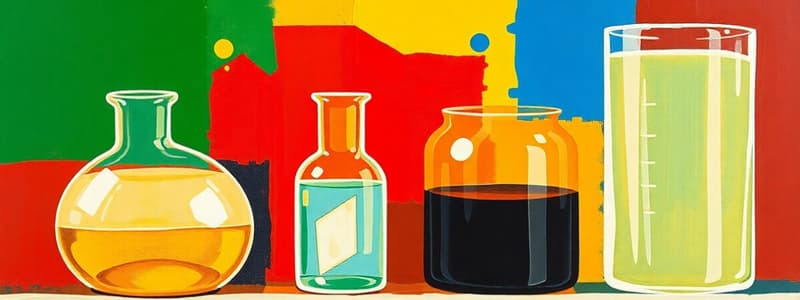Podcast
Questions and Answers
What method is used to separate components based on differences in density?
What method is used to separate components based on differences in density?
- Centrifuge
- Decanting (correct)
- Filtration
- Evaporation
Which separation method relies on the boiling point of liquids?
Which separation method relies on the boiling point of liquids?
- Density separation
- Filtration
- Distillation (correct)
- Magnetic separation
What physical property does paper chromatography exploit?
What physical property does paper chromatography exploit?
- Density
- Molecular attraction (correct)
- Magnetism
- Color
Which method would be most appropriate for obtaining seawater salt?
Which method would be most appropriate for obtaining seawater salt?
Which mixture separation technique uses a circular motion to accelerate the sinking of denser components?
Which mixture separation technique uses a circular motion to accelerate the sinking of denser components?
What is the primary principle behind the method of evaporation?
What is the primary principle behind the method of evaporation?
What is the goal of fractional crystallization?
What is the goal of fractional crystallization?
Which method utilizes a filter to separate particles based on size?
Which method utilizes a filter to separate particles based on size?
Study Notes
Mechanical Separation
- Used to separate mixtures physically.
- Examples include recycling paper, plastics, and metals.
Magnetic Separation
- Utilizes the physical property of magnetism.
- Example: Separating metals in a scrap yard.
Filtration
- Separates based on the physical property of the state of matter.
- A screen allows liquid particles to pass through but traps solid particles.
- Examples include filtering coffee and spaghetti.
- A filter can also separate solid particles of different sizes.
- Examples include window screens, air filters, and sand sieves.
Decanting
- Involves pouring off a liquid, leaving behind another liquid or solid.
- Takes advantage of density differences.
- Examples include decanting a liquid from a precipitate or water from rice.
Distillation
- Separates liquids based on their different boiling points.
- A distillation tower ("still") is used.
- Examples include distilling alcohol or oil.
Evaporation
- Vaporizes a liquid, leaving behind dissolved solids.
- Used to separate salt solutions.
- Example: Obtaining sea salt from salty ocean water.
Density Separation
- Utilizes the property of density.
- More dense components sink to the bottom, while less dense components float.
Centrifuge
- Utilizes circular motion to accelerate the separation of denser components to the bottom.
- Example: Separating blood components or DNA from blood.
Paper Chromatography
- Uses the property of molecular attraction to separate mixtures.
- Different molecules have varying attractions for the paper (stationary phase) compared to the solvent (mobile phase).
- Examples include separating plant pigments and dyes.
Fractional Crystallization
- Dissolved substances crystallize out of a solution once their solubility limit is reached as the solution cools.
- Examples include growing rock candy and the crystallization of a magma chamber.
Studying That Suits You
Use AI to generate personalized quizzes and flashcards to suit your learning preferences.
Related Documents
Description
Explore various methods of separating mixtures in chemistry, focusing on techniques such as mechanical separation, magnetic separation, filtration, and distillation. This quiz covers the principles behind each method and provides real-world examples for better understanding.




